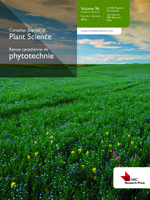Debnath, S. C. 2011. Bioreactors and molecular analysis in berry crop micropropagation - A review. Can. J. Plant Sci. 91: 147-157. While berry fruits have long enjoyed huge popularity among consumers, tremendous progress in plant tissue culture, resulting in great advances in micropropagation, has occurred. Of particular significance has been the evolution of the technology permitting multiplication of berry plants in bioreactors containing liquid media. Although automation of micropropagation in bioreactors has been advanced as a possible way of reducing propagation cost, optimal plant production depends upon better understanding of physiological and biochemical responses of plant to the signals of culture microenvironment and an optimization of specific physical and chemical culture conditions to control the morphogenesis of berry plants in liquid culture systems. Clonal fidelity can be a serious problem, and molecular strategies have been developed in order to reduce the variation to manageable levels. Molecular markers have been introduced to tissue culture research and can potentially be used in various facets of pertinent studies with berry crops. The paper focuses on bioreactor systems combined with semi-solid media used for in vitro culture of berry crops, cultivation of micropropagules and employment of molecular markers in micropropagated plants for the assessment of genetic fidelity, uniformity, stability and trueness-to-type among donor plants and tissue culture regenerants. The pertinent literature is reviewed and the relative merits and shortcomings of the various molecular markers applied are presented with an emphasis on the nature of tissue culture-induced variation.
BioOne.org will be down briefly for maintenance on 12 February 2025 between 18:00-21:00 Pacific Time US. We apologize for any inconvenience.
How to translate text using browser tools
1 January 2011
Bioreactors and molecular analysis in berry crop micropropagation — A review
Samir C. Debnath
ACCESS THE FULL ARTICLE
It is not available for individual sale.
This article is only available to subscribers.
It is not available for individual sale.
It is not available for individual sale.
Berry crops
culture in vitro
in vitro culture
marqueurs moléculaires
molecular markers
Petits fruits





